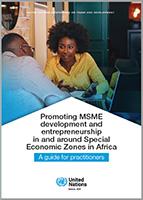
Special Economic Zones (SEZs) are an ever-popular policy tool for the promotion of investment, employment generation, and the stimulation of innovation. While traditionally, SEZ policies have focused on the attraction of foreign large-scale industrial investors, there has been an increasing interest on how to leverage SEZ policies to support micro, small and medium-sized enterprises (MSMES) and foster local entrepreneurship.
The importance of MSMEs and entrepreneurship for economic and social outcomes has been extensively documented. In most economies, MSMEs represent the vast majority of firms, in particular in the developing world. They contribute to the lion share of formal and informal employment and typically grow faster than large established companies.
The entry of new firms has been shown to promote productivity and value added. However, MSMEs also encounter particular challenges. Among other, they face higher hurdles to access finance, struggle more with bureaucratic processes, and often have lower managerial and technological capabilities. These difficulties make it even more challenging for them to realize market opportunities and their growth potential.
Given the proliferation of SEZs in Africa, the question arises to what extent SEZ policies are suited and can be leveraged to alleviate these constraints and support local MSME growth and entrepreneurship.
Against this backdrop, UNCTAD and the Africa Economic Zones Organization (AEZO) have joined forces to explore the opportunities and challenges involved in promoting entrepreneurship in and around SEZs in Africa.
The objective of this effort is to offer practical guidance to policymakers, SEZ authorities and management companies, and other institutions and stakeholders engaged in MSME support in the development of policies, initiatives, and facilities for the effective promotion of entrepreneurship in and around SEZs.
The guide is structured as follows:
Section 1 explores the different ways in which SEZs can contribute to promote entrepreneurship and MSMEs, develops a typology of interventions and provides international examples of initiatives.
Section 2 maps the current initiatives in African SEZs related to entrepreneurship support.
Section 3 follows with an in-depth description of nine selected initiatives in African SEZS in
Section 4 summarizes the lessons learned and presents a practical guide for policymakers.


